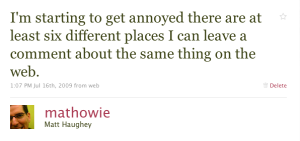Broken feedback loops
Last summer I wrote this quick quip on twitter about my frustrations with Google Reader and Facebook comments:

Many years ago, people started building weblog ranking lists and then weblog search engines and eventually we had a rich set of tools that let you know what someone was saying about something you posted online. At first, these were often dubbed "ego search" and there were comparisons to navel gazing that early bloggers (myself included) were known for.
Over the years I realized tracking mentions of your work across the web wasn't merely for the ego stroke, it was quite a valuable bit of feedback. In addition to the direct feedback you might get on a post through your own comments system, following mentions in Technorati, RSS search engines (I still use bloglines' citations to do URL searches of my domains), and Delicious (which offers a simple backlink search) gave a broader picture of what people liked and disliked about your work. On places like Flickr that are more about sharing photos and sometimes about the nature of learning photography, direct feedback is key to becoming better at what you do.
Today Buzz launched and I realized my annoyance expressed last July was going to get amplified again as there was yet another new channel that could chop up any piece of micro-content I've produced and let people comment, rate, and share it without me having any remote knowledge of it unless I happen to follow someone that interacted with it. It's just like how Facebook doesn't inform me that this very blog post might be shared as a link there, and maybe 7 people hit the "Like" button and maybe there are five comments on it there that I can't answer because I don't know it exists. Google Reader, as much as I love it as a tool for reading blogs, suffers the same issues.
Let me be clear this isn't an ownership issue, it's not a frail ego issue, and it's not that I don't love remixing (I do!). My point is when there are half a dozen places someone can hit a like button or mark as a favorite or leave a comment that I have no knowledge of, the feedback loop is broken.
When I think about the years I've learned to become a more concise writer and a better photographer by throwing shit online and gathering feedback, then repeating the cycle again, I'm dismayed to see all these new tools that lack appropriate feedback mechanisms that can relay information back to the original authors.
So to future application creators I ask that you simply respect the creators of content and help them improve by offering notification, search, and/or backlink capabilities so it's possible for someone to see where their creations end up. I know it's a lot easier to just consider it all "output" within your application, but the internet is a great communication medium not just for relaying information from anyone to anywhere on earth, but for also making it a dialogue between reader and writer.
Don't break the feedback loop.
Update: It might help other writers and photographers to know what tools I use (that you might not be aware of) as feedback loops. Here's a follow-up post about that.
Subscribe to our newsletter.
Be the first to know - subscribe today





